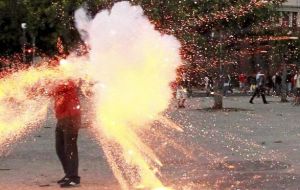MercoPress. South Atlantic News Agency
Brazil, the most dangerous country for Latam journalists, according to RSF
 In thirteen years, 88 journalists were killed and 18 have gone missing in Mexico (Pic DPA)
In thirteen years, 88 journalists were killed and 18 have gone missing in Mexico (Pic DPA) More than 20 years after the fall of the dictatorships and civil wars that dominated Latin America, the region continues to be marked by a strong retaliation against the press, according to Reporters Without Borders, RSF, most recent annual index on the state of press freedom, which was published on Feb. 12.
The index is an annual report that RSF publishes since 2002. It reflects the degree of freedom of the press in each country and what measures authorities currently employ to ensure that freedom is respected.
Journalists and human rights defenders face violence coming from organized crime, paramilitary organizations and even their own governments, the report said.
One of the most alarming cases is Brazil, which surpassed Mexico as the country with the most journalists killed, with five journalists murdered in 2013.
In Honduras, number 129 on the list, 30 journalists have been killed in the past decade -- 27 of them during the June 2009 coup that overthrew the president-elect Manuel Zelaya. It was confirmed that nine of the journalists were killed in relation to their profession.
“In this failed state, almost-absolute impunity constitutes the rule. The attacks, the threats, the aggressions and even the “canonization” of certain communications media are the work of private militia at the pay of the landowners, de military and the police (of military status), as well as of cartels with a strong presence in the region,” the report said.
The same thing happens in Peru and Colombia, where covering drug trafficking, corruption, territorial conflicts or mining heightens risks for journalists. Even if the Colombian governments and the FARC are able to come to an agreement, it won’t erase the “narco-paramilitares”, paramilitary organizations born from years of war that pose a significant risk to journalists in the area.
A similar situation occurs in Mexico, where cartels like the Zetas, and other criminal organizations, act in the collusion with corrupt authorities at the local and federal levels. With 88 journalists killed and 18 gone missing in the last 13 years, the “federal offensive against drug trafficking” that former President Felipe Calderon began only worsened the situation, in addition to leaving more than 60,000 dead.
At the same time, journalism is used as a political weapon in countries where the private and public (state) sectors battle it out. Venezuela, Ecuador, Bolivia and, to a degree, Argentina, illustrate this with their various forms of communications laws.
Also in the report, RSF wrote that the continent's two largest powers, Brazil and the United States, “should place more importance in freedom of information… unfortunately the reality is far from that.” The organization condemned the U.S. government's response to Edward Snowden, who leaked information about the massive surveillance programs developed by the National Security Agency (NSA).
There are no Latin American countries in the top 20 places of the list, but Costa Rica and Uruguay were 21 and 26, respectively. According to the ranking, Finland is number one, followed by Netherlands, Norway, Luxembourg, Andorra, Lichtenstein, Denmark, Iceland, New Zealand, Sweden, Estonia, Austria, Czech republic, Germany, Switzerland, Ireland, Jamaica, Canada, Poland, Slovakia, Costa Rica, while UK ranks 33. (World Press Freedom Index, 2014; Reporters without Borders).





Top Comments
Disclaimer & comment rules-

-

-

Read all commentsMmmmmm....Such a resounding endorsement from such an objective and independent organization. Brassie, are you proud? What have you to say about this?
Feb 15th, 2014 - 02:21 pm 0So What? Will that be your comeback? Or will you just refrain from even answering?
Do these trolls no see the path that Latam is on? How can anyone in good conscious really condone this path? All of you fail to comprehend that until you acquire a strong government that can garner respect in the community of world nations, you and all your people will continue on this path and always falter.
The commie / Marxist bastards that infest the planet seem to be getting stronger every year.
Feb 15th, 2014 - 02:26 pm 0I wonder what the answer is: kill them all!
@2
Feb 15th, 2014 - 02:29 pm 0Also in the report, RSF wrote that the continent's two largest powers, Brazil and the United States, “should place more importance in freedom of information… unfortunately the reality is far from that.”
Canadians and Astecas....Where are you?
https://www.youtube.com/watch?v=w8PcAqbjfns&list=FLmXPTu1f8AdGlizWNiASx2A
Commenting for this story is now closed.
If you have a Facebook account, become a fan and comment on our Facebook Page!